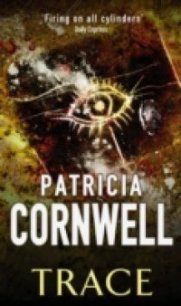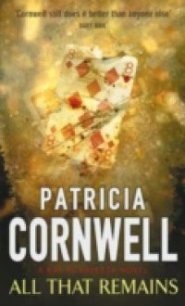The Last Precinct - Cornwell Patricia (лучшие книги читать онлайн TXT) 📗
"And when we truly resent and hate someone, it's also hard to give them our time and attention, to be interested in them as if they are worth figuring out. We have to be interested in Chandonne. Intensely interested. I need you to be more interested in him than you have in anyone else in your life."
I don't disagree with what Berger is saying. I know she is pointing out a significant truth. But I desperately resist being interested in Chandonne. "I've always been victim-driven," I tell Berger. "I've never spent my time trying to get into the soul and mind of the assholes who do it."
"And you've never been involved in a case like this, either," she counters. "You've never been a suspect in a murder, either. I can help you with your mess. And I need you to help me with mine. Help me get into Chandonne's mind, into his heart. I need you not to hate him."
I am silent. I don't want to give Chandonne any more of myself than he has already taken. I feel tears of frustration and fury and blink them back. "How can you help me?" I ask Berger. "You have no jurisdiction here. Diane Bray is not your case. You can drag her into your Molineux motion in Susan Pless's murder, but I'm left hanging out to dry when it comes to a Richmond special grand jury. Especially if certain people are trying to make it appear that I killed her, killed Bray. That I'm deranged." I take a deep breath. My heart races.
"The key to your clearing your name is my same key," she replies. "Susan Pless. How could you possibly have had anything to do with that death? How could you have tampered with that evidence?"
She waits for my answer, as if I have one. The thought numbs me. Of course, I had nothing to do with Susan Pless's murder.
"My question is this," Berger goes on. "If the DNA from Susan's case matches your cases here and possibly the DNA in the Paris cases, doesn't that mean it has to be the same person who killed all these people?"
"I guess jurors don't have to believe it beyond a reasonable doubt. All they need is probable cause," I reply, playing devil's advocate in my own dilemma. "The chipping hammer with Bray's blood on it_found in my house. And a receipt showing that I bought a chipping hammer. And the chipping hammer I actually bought has vanished. All sort of sticks out like a smoking gun, Ms. Berger, don't you think?"
She touches my shoulder. "Answer me this," she says. "Did you do it?"
"No," I reply. "No, I didn't do it."
"Good. Because I can't afford for you to have done it," she says. "I need you. They need you." She stares out at the cold, empty house beyond our windshield, indicating Chandonne's other victims, the ones who didn't survive. They need me. "Okay." She returns us to why we are waiting in this driveway. She returns us to Diane Bray. "So he comes through her front door. There's no sign of a struggle and he doesn't attack her until they are all the way to the other end of the house, in her bedroom. It doesn't appear she attempted to escape or defend herself in any way. She never went for her gun? She's a policewoman. Where's her gun?"
"I know when he forced his way into my house," I reply, "he tried to throw his coat over my head." I am trying to do what she wants. I act as if I am talking about someone else.
"Then maybe he nets Bray with a coat or something else he threw over her head, and forced her back to the bedroom?"
"Maybe. The police never found Bray's gun. Not that I know of," I reply.
"Huh. Wonder what he did with that?" Berger muses.
Headlights shine in the rearview mirror and I turn around. A station wagon slows at the driveway.
"There was also money missing from her house," I add. 'Twenty-five hundred dollars, drug money Anderson had just brought over earlier that evening. According to her, to Anderson." The station wagon pulls up behind us. "From the sale of prescription pills, if Anderson's telling the truth."
"Do you think she was telling the truth?" Berger asks.
"The whole truth? I don't know," I reply. "So maybe Chan-donne took the money and he may have taken her gun, too. Unless Anderson took the money when she came back to the house the next morning and found the body. But after seeing what was in the master bedroom, it's frankly hard for me to imagine she did anything but run like the wind."
"Based on the photographs you've shown me, I would tend to agree," Berger replies.
We get out. I can't see Eric Bray well enough to recognize him, but my vague impression is of a well-dressed, attractive man who is close in age to his slain sister, maybe forty or so. He hands Berger a key attached to a manila tag. "The alarm code's written on it," he says. "I'm just going to wait out here."
"I'm really sorry to put you to all this trouble." Berger gathers a camera and an accordion file from the backseat. "Especially on Christmas Eve."
"I know you people have to do your job," he says in a dull, flat tone.
"Have you been inside?"
He hesitates and stares off at the house. "Can't do it." His voice rises with emotion and tears cut him off. He shakes his head and climbs back inside his car. "I don't know how any of us… Well," he clears his throat, talking to us through the open car door, the interior light on, the bell dinging. "How we're ever going to go in and deal with her things." He focuses on me, and Berger introduces us. I have no doubt he already knows very well who I am.
"There are professional cleaning services in the area," I delicately tell him. "I suggest you contact one and have them go in before you or any other family member does. Service Master, for example." I have been through this many times with families whose loved ones have died violently inside the residence. No one should have to go in and deal with their loved one's blood and brains everywhere.
"They can just go in without us?" he asks me. "The cleaning people can?"
"Leave a key in a lock box at the door. And yes, they'll go in and take care of things without you present," I reply. "They're bonded and insured."
"I want to do that. We want to go on and sell this place," he tells Berger. "If you're not needing it anymore."
"I'll let you know," she replies. "But you, of course, have the right to do whatever you want with the property, Mr. Bray."
"Well, I don't know who will buy it after what happened," he mutters.
Neither Berger nor I comment. He is probably right. Most people do not want a house where someone has been murdered. "I already talked to one realtor," he goes on in a dull voice that belies his anger. "They said they couldn't take it on. They're sorry and all that, but they didn't want to represent the property. I don't know what to do." He stares out at the dark, lifeless house. "You know, we weren't real close to Diane, no one in the family was. She wasn't what I would call really into her family or friends. Mostly just into herself, and I know I probably shouldn't say that. But it's the damn honest truth."
"Did you see her very often?" Berger asks him.
He shakes his head, no. "I guess I knew her best because we're only two years apart. We all knew she had more money than we could understand. She stopped by my house on Thanksgiving, pulled up in this brand new red Jaguar." He smiles bitterly and shakes his head again. "That's when I knew for sure she was into something I probably didn't want to know a damn thing about. I'm not surprised, really." He takes a deep, quiet breath. "Not surprised really that it's ended up like this."
"Were you aware of her involvement in drugs?" Berger shifts her file to her other arm.
I am getting cold standing out here, and the dark house pulls at us like a black hole.
"The police have said some things. Diane never talked about what she did and we didn't ask, frankly. As far as we know, she didn't even have a will. So now we've got that mess, too," Eric Bray tells us. "And what to do with her things." He looks up at us from the driver's seat and the dark can't hide his misery. "I really don't know what to do."



